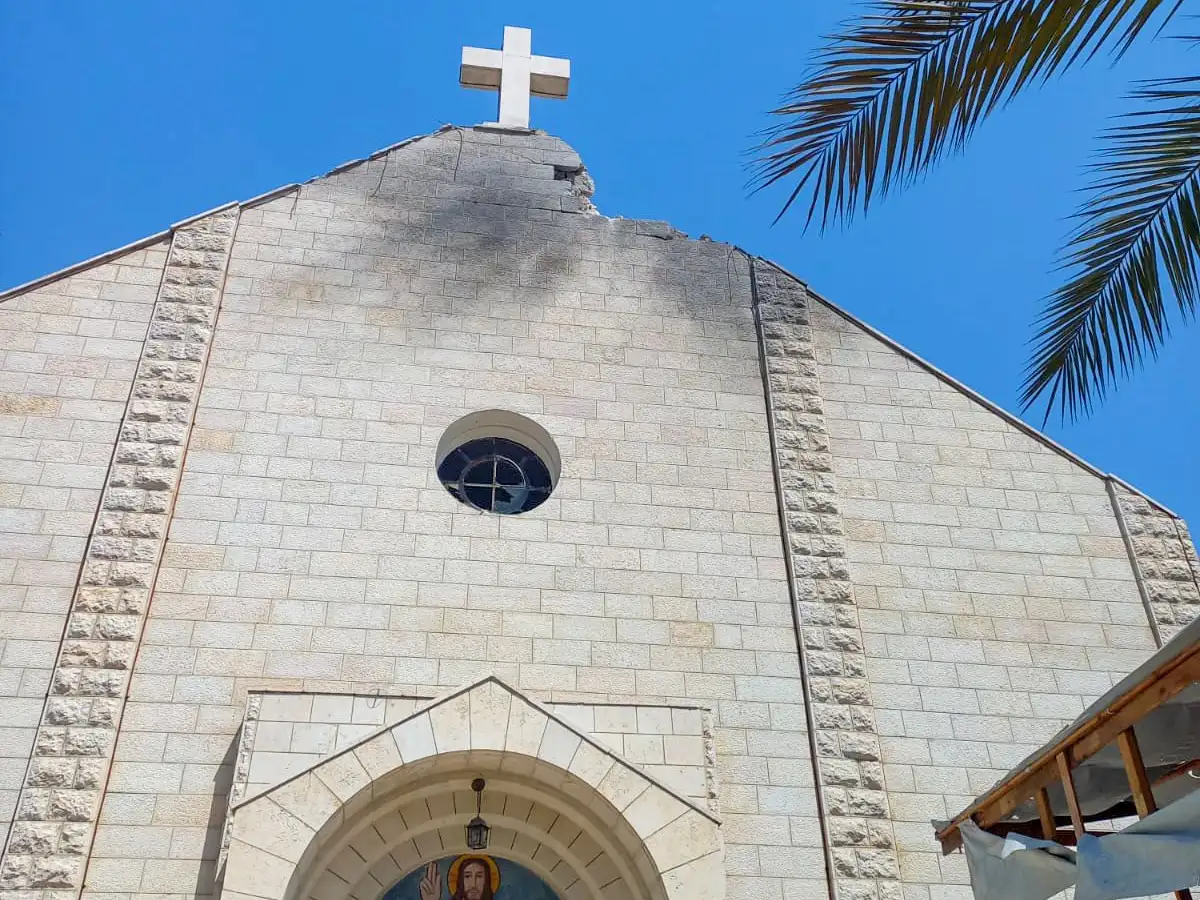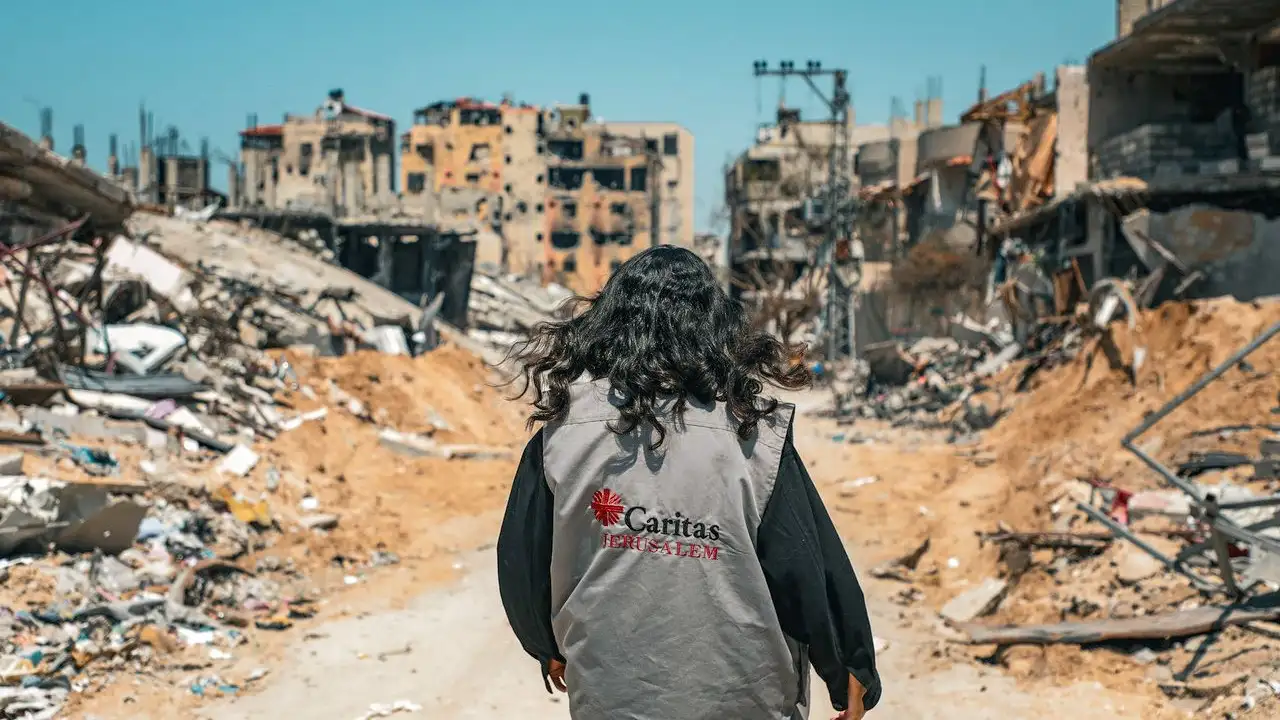Donate to the Gaza Crisis Appeal
Millions of people have fled their homes in search of safety. They urgently need shelter, food and basic supplies.


The Holy Family Church in Gaza, which was damaged after being struck by a shell in an attack that killed three people and injured others
Starvation is spreading across Gaza. As the Israeli government’s siege starves the people of Gaza, people risk being shot just to feed their families.
With supplies now totally depleted, increasing numbers of people are now dying from lack of food with humanitarian organisations witnessing their own colleagues and partners waste away before their eyes.
Decisive action is needed now.
Despite overwhelming challenges and risk to life, our local partners are clear that, with your support, they can continue to deliver vital support to those in greatest need.
Millions of people have fled their homes in search of safety. They urgently need shelter, food and basic supplies.
Please tell your MP that the UK government must take bolder and more decisive action on the Gaza crisis.
Join us in prayer by adding your name as a sign of your prayers, which we will share in solidarity with our partners who are responding to this humanitarian crisis.
People are being killed at food distribution sites in Gaza. As of 13 July, the UN confirmed 875 Palestinians were killed while seeking food, 201 on aid routes and the rest at distribution points. Thousands more have been injured.
Doctors report record rates of acute malnutrition, especially among children and older people. Illnesses like acute watery diarrhoea are spreading, markets are empty, waste is piling up, and adults are collapsing on the streets from hunger and dehydration. Meanwhile, humanitarian agencies have the capacity and supplies to respond at scale. But, with access denied, there is very limited ability to reach those in need, including our own exhausted and starved team.
Just outside Gaza, in warehouses - and even within Gaza itself - tonnes of food, clean water, medical supplies, shelter items and fuel sit untouched with humanitarian organisations blocked from accessing or delivering them. The government of Israel’s restrictions, delays and fragmentation under its total siege have created chaos, starvation and death.
An aid worker providing psychosocial support spoke of the devastating impact on children: “Children tell their parents they want to go to heaven, because at least heaven has food.”
On 17 July, three people were killed and others injured following an attack on the Holy Family Church in Gaza by Israel.
I once again call for an immediate end to the barbarity of this war and for a peaceful resolution to the conflict
Pope Leo XIV reiterated his call for an immediate ceasefire and that international law must be respected:
“I once again call for an immediate end to the barbarity of this war and for a peaceful resolution to the conflict.”
The Latin Patriarch, Cardinal Pizzaballa, visited Gaza after the attack on the Holy Family Church and said:
“Humanitarian aid is not only necessary — it is a matter of life and death. Refusing it is not a delay, but a sentence. Every hour without food, water, medicine and shelter causes deep harm.
“To target a church where families sought refuge, where children slept, violates every principle of humanity and international law. The world cannot remain silent.”
CAFOD has been working in the Middle East for decades, across Gaza, the West Bank, Lebanon and Israel. Despite immense challenges, CAFOD’s local partners continue to deliver vital support to those in greatest need.
Through the Church and community networks, which CAFOD’s local partners have, they are still able to respond in very difficult circumstances.
CAFOD’s local Church partner, Caritas Jerusalem, is operating medical points across Gaza, treating chronic illnesses, running pharmacies (though dangerously low on supplies), and supporting families mentally and physically through this crisis. The Caritas team is constantly adapting to changing circumstances and moving the location of their mobile clinics depending on where it's safest to operate.
Other local partners are providing food and shelter for displaced families. However, they report growing difficulty in sourcing food, with the nutritional value of meals declining sharply.
Our work in Gaza is a testament to our unwavering commitment to the health and wellbeing of the community, even under the most difficult conditions

More than 100 organisations (including CAFOD) are urging governments to take decisive action to:
open all land crossings
restore the full flow of food, clean water, medical supplies, shelter items and fuel through a principled, UN-led mechanism
end the siege
agree to a ceasefire now.
The UK and 25 other governments are also calling for an end to the war in Gaza.
While humanitarian zones continue to be hit, more in the way of concrete action is still needed. CAFOD's Director of Advocacy Neil Thorns explained:
“The joint statement from the UK and 25 other nations, calling for an urgent end to the war in Gaza, is only worthwhile if it leads to immediate concrete action. We urge the Foreign Secretary David Lammy MP to suspend arms sales to Israel and ban all settlement trade today.
“Attacks on humanitarian zones, hospitals, schools and places of worship are a violation of international law. The people of Gaza have almost nowhere safe left to go. We need more than words to help broker a peaceful resolution and bring urgent relief to hundreds of thousands facing intolerable suffering."


With CAFOD's support, one of our partners in Gaza has opened their premises as shelter centres for displaced people
A key aspect of the work funded by donations from CAFOD supporters includes psychosocial assistance for people experiencing trauma and grief from the horrific violence they’ve been exposed to.
The trauma of conflict is intensified for young people because there is little-to-no access to safe spaces for education and recreation. Thankfully, CAFOD-funded partners are helping young people continue to study maths, Arabic and English. They are offering reading sessions and organising entertainment so children can experience brief moments of joy and relief, and they are celebrating important holidays, like Eid, so young people don’t lose their sense of culture.
CAFOD granted an additional £100,000 towards these vital efforts. With this extra funding, our partners are helping even more children through these challenging times.
Children who took part in the drawing workshop said: “It wasn’t just a training course in the basics of drawing, but a space for renewing positive energy, improving psychology, meeting new friends and spending time away from the heat of the tent and the pressure of migration.”
The suffering of both Palestinians and Israelis has deepened every day since Hamas’ attack on Israel on 7 October 2023, which killed around 1,200 people. Israeli hostages continue to be held in Gaza and countless lives have been transformed by pain and grief.
Israel’s response to the attack has seen daily relentless bombardment on Palestinians in Gaza. The casualty figures up to 23 July 2025 are horrifying: they show that over 59,000 Palestinians have been killed and more than 140,000 injured.
Millions of people have fled their homes in search of safety. They urgently need shelter, food and basic supplies.
Please tell your MP that the UK government must take bolder and more decisive action on the Gaza crisis.
Join us in prayer by adding your name as a sign of your prayers, which we will share in solidarity with our partners who are responding to this humanitarian crisis.